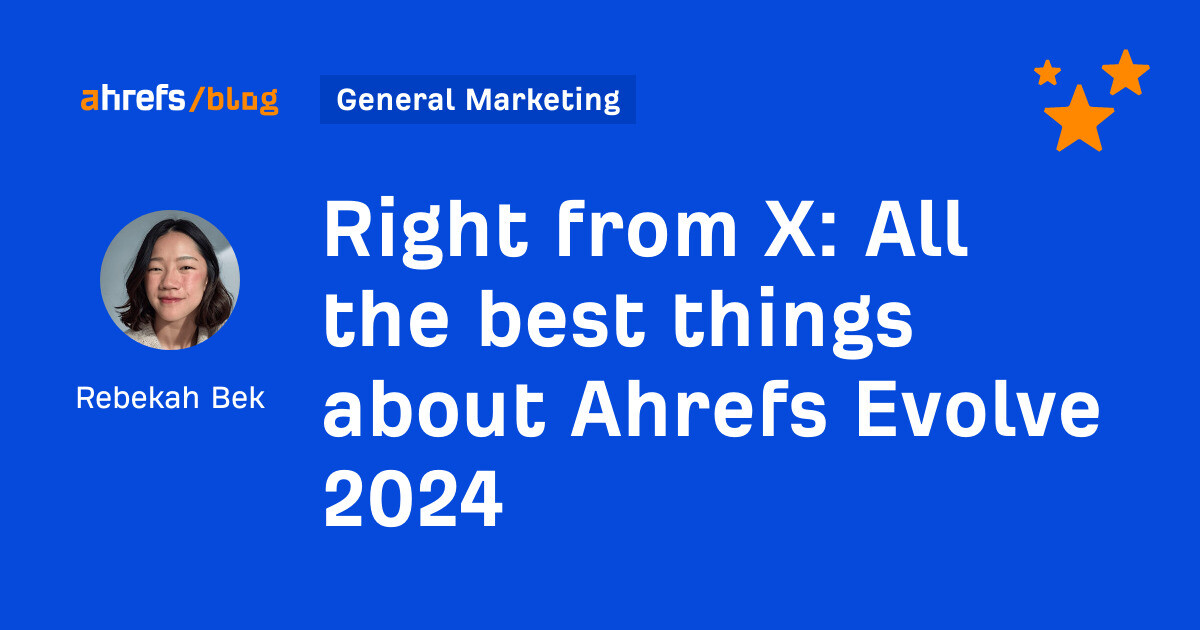SEO
All the best things about Ahrefs Evolve 2024

Hey all, I’m Rebekah and I am your Chosen One to “do a blog post for Ahrefs Evolve 2024”.
What does that entail exactly? I don’t know. In fact, Sam Oh asked me yesterday what the title of this post would be. “Is it like…Ahrefs Evolve 2024: Recap of day 1 and day 2…?”
Even as I nodded, I couldn’t get over how absolutely boring that sounded. So I’m going to do THIS instead: a curation of all the best things YOU loved about Ahrefs’ first conference, lifted directly from X.
Let’s go!
OUR HUGE SCREEN
The largest presentation screen I’ve ever seen! #ahrefsevolve pic.twitter.com/oboiMFW1TN
— Patrick Stox (@patrickstox) October 24, 2024
This is the biggest presentation screen I ever seen in my life. It’s like iMax for SEO presentations. #ahrefsevolve pic.twitter.com/sAfZ1rtePx
— Suganthan Mohanadasan (@Suganthanmn) October 24, 2024
CONFERENCE VENUE ITSELF
It was recently named the best new skyscraper in the world, by the way.
The Ahrefs conference venue feels like being in inception. #AhrefsEvolve pic.twitter.com/18Yjai1Cej
— Suganthan Mohanadasan (@Suganthanmn) October 24, 2024
I’m in Singapore for @ahrefs Evolve this week. Keen to connect with people doing interesting work on the future of search / AI #ahrefsevolve pic.twitter.com/s00UkIbxpf
— Alex Denning (@AlexDenning) October 23, 2024
OUR AMAZING SPEAKER LINEUP – SUPER INFORMATIVE, USEFUL TALKS!
A super insightful explanation of how Google Search Ranking works #ahrefsevolve pic.twitter.com/Cd1VSET2Aj
— Amanda Walls (@amandajwalls) October 24, 2024
“would I even do this if Google didn’t exist?” – what a great question to assess if you actually have the right focus when creating content amazing presentation from @amandaecking at #AhrefsEvolve pic.twitter.com/a6OKbKxwiS
— Aleyda Solis ️ (@aleyda) October 24, 2024
Attending @CyrusShepard ‘s talk on WTF is Helpful Content in Google’s algorithm at #AhrefsEvolve
“Focus on people first content”
Super relevant for content creators who want to stay ahead of the ever evolving Google search curve! #SEOTalk #SEO pic.twitter.com/KRTL13SB0g
This is the first time I am listening to @aleyda and it is really amazing. Lot of insights and actionable information.
Thank you #aleyda for power packed presentation.#AhrefsEvolve @ahrefs #seo pic.twitter.com/Xe3A9MGfrr
— Jignesh Gohel (@jigneshgohel) October 25, 2024
— Parth Suba (@parthsuba77) October 24, 2024
@thinking_slows thoughts on AI content – “it’s very good if you want to be average”.
We can do a lot better and Ryan explains how. Love it @ahrefs #AhrefsEvolve pic.twitter.com/qFqWs6QBH5
— Andy Chadwick (@digitalquokka) October 24, 2024
A super insightful explanation of how Google Search Ranking works #ahrefsevolve pic.twitter.com/Cd1VSET2Aj
— Amanda Walls (@amandajwalls) October 24, 2024
This is the first time I am listening to @aleyda and it is really amazing. Lot of insights and actionable information.
Thank you #aleyda for power packed presentation.#AhrefsEvolve @ahrefs #seo pic.twitter.com/Xe3A9MGfrr
— Jignesh Gohel (@jigneshgohel) October 25, 2024
GREAT MUSIC
First time I’ve ever Shazam’d a track during SEO conference ambience…. and the track wasn’t even Shazamable! #AhrefsEvolve @ahrefs pic.twitter.com/ZDzJOZMILt
— Lily Ray (@lilyraynyc) October 24, 2024
AMAZING GOODIES
Ahrefs Evolveきました!@ahrefs @AhrefsJP #AhrefsEvolve pic.twitter.com/33EiejQPdX
— さくらぎ (@sakuragi_ksy) October 24, 2024
Aside from the very interesting topics, what makes this conference even cooler are the ton of awesome freebies
Kudos for making all of these happen for #AhrefsEvolve @ahrefs team pic.twitter.com/DGzk5FSTN8
— Krista Melgarejo (@kimelgarejo) October 24, 2024
Content Goblin and SEO alligator party stickers are definitely going on my laptop. @ahrefs #ahrefsevolve pic.twitter.com/QBsBuY5Yix
— Patrick Stox (@patrickstox) October 24, 2024
This is one of the best swag bags I’ve received at any conference!
Either @ahrefs actually cares or the other conference swag bags aren’t up to par w Ahrefs!#AhrefsEvolve pic.twitter.com/Yc9e6wZPHn— Moses Sanchez (@SanchezMoses) October 25, 2024
SELFIE BATTLE
Some background: Tim and Sam have a challenge going on to see who can take the most number of selfies with all of you. Last I heard, Sam was winning – but there is room for a comeback yet!
Got the rare selfie with both @timsoulo and @samsgoh #AhrefsEvolve
— Bernard Huang (@bernardjhuang) October 24, 2024
THAT BELL
@timsoulo @ahrefs #AhrefsEvolve pic.twitter.com/6ypWaTGDDP
— Jinbo Liang (@JinboLiang) October 24, 2024
STICKER WALL
Viva la vida, viva Seo!
Awante Argentina loco!#AhrefsEvolve pic.twitter.com/sfhbI2kWSH
— Gaston Riera. (@GastonRiera) October 24, 2024
AND, OF COURSE…ALL OF YOU!
#AhrefsEvolve let’s goooooooooooo!!! pic.twitter.com/THtdvdtUyB
— Tim Soulo (@timsoulo) October 24, 2024
–
There’s a TON more content on LinkedIn – click here – but I have limited time to get this post up and can’t quite figure out how to embed LinkedIn posts so…let’s stop here for now. I’ll keep updating as we go along!

![How AEO Will Impact Your Business's Google Visibility in 2026 Why Your Small Business’s Google Visibility in 2026 Depends on AEO [Webinar]](https://articles.entireweb.com/wp-content/uploads/2026/01/How-AEO-Will-Impact-Your-Businesss-Google-Visibility-in-2026-400x240.png)
![How AEO Will Impact Your Business's Google Visibility in 2026 Why Your Small Business’s Google Visibility in 2026 Depends on AEO [Webinar]](https://articles.entireweb.com/wp-content/uploads/2026/01/How-AEO-Will-Impact-Your-Businesss-Google-Visibility-in-2026-80x80.png)















